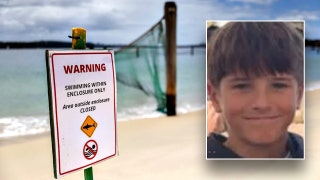BELGRADE, Serbia – Soldiers are marching, battle tanks are rumbling on the streets and fighter jets are flying overhead. No, it's not another war in the Balkans. It's Serbia preparing to stage a hero's welcome for Russian President Vladimir Putin with the country's first military parade in 30 years.
The red carpet reception for Putin, as he arrives in Belgrade on Thursday, comes as Serbia finds itself caught in the middle of Moscow's row with the West over Ukraine. The Balkan nation is increasingly confronted with a difficult choice: to continue down its officially declared path toward European Union membership, or give up that goal and forge even closer ties with its traditional Slavic ally Russia.
Putin will stop by Belgrade for only six hours to mark the 70th anniversary of the liberation of the Serbian capital, Belgrade, from Nazi German occupation by the Red Army and Yugoslav Communist Partisans. Here's a look at what's at stake:
WHY IS PUTIN VISIT SO CONTROVERSIAL?
Some Western officials have said that staging a military parade for the leader accused of fomenting the war in eastern Ukraine by sending Russian troops to help pro-Russian rebels doesn't help Serbia in its proclaimed goal to be part of Western alliances.
U.S. Ambassador to Serbia Michael Kirby said he doesn't want to tell Belgrade whom it could invite, but suggested that he sees Putin's visit as untimely, to say the least. "You can have good relations with Russia and China, and with the United States. But our view of visits by Chinese and Russian officials differs. Chinese have not attacked anyone, but the Russians have," Kirby recently told Belgrade's Vecernje Novosti newspaper.
Serbian officials have acknowledged that they have been under Western criticism for Putin's visit — his second in three years — but they said U.S. President Barack Obama would also be welcome, if he wanted to come. No American president has visited Serbia since the bloody breakup of the former Yugoslavia in the 1990s. "I have nothing against (Obama) visiting Belgrade, but is he going to come? It takes two to tango," said Serbian Foreign Minister Ivica Dacic.
___
WHAT DOES PUTIN WANT FROM SERBIA?
During his last visit to Belgrade in March 2011, Putin said he has "nothing against" Serbia joining the EU. But he strongly warned that it should never join NATO. If it did, he said, Russia would have to point its nuclear arsenal toward the Balkan country that is a member of the Western military alliance's outreach "Partnership for Peace" program.
Kremlin officials have also told Serbia that when and if it joins the EU — which is not expected before 2020 — its lucrative free trade agreement with Russia would no longer be valid.
Putin is also expected to pressure Serbia to start building a Moscow-controlled gas pipeline. Serbia has recently indicated it will bow to EU pressure and not start building its sector of the South Stream pipeline, which is to bypass Ukraine to transport Russian natural gas to Europe. Serbian Prime Minister Aleksandar Vucic said last week "it makes no sense" to start the construction of the pipeline, without an agreement on its legality between the EU and Moscow.
___
WHAT DOES SERBIA WANT FROM PUTIN?
Although Serbian officials say they respect Ukraine's territorial integrity and do not support Russia's annexation of Crimea, they have refused to impose EU-like sanctions against Russia. They say that would be disastrous for the country's stagnating economy — especially since most of its energy sector is controlled by Gazprom, the Russian energy giant. Instead, Serbia is hoping to capitalize on Russia's counter-ban on Western goods by increasing its food exports to Russia. The EU has warned Serbia to refrain from "exploiting" the Russian ban by increasing the exports with state subsidies.
There are historic Orthodox Slavic bonds between Russians and Serbians and local politicians must respect Putin's widespread popularity in Serbia in order to please voters.
___
AN OBSERVER'S PERSPECTIVE
Russia sees Serbia — although it was never in the Soviet bloc — as one of its last true allies in the Balkans. Moscow has issued quiet threats that it could drop its endorsement in the United Nations for Serbia's opposition to the independence of Kosovo, a one-time province that declared statehood in 2008, if it moves closer to the West.
"It is going to be an extremely short visit, but one that will harm Serbia's EU integration," said political analyst Jelena Milic of the Belgrade-based Center for Euro-Atlantic Studies. "That is Putin's primary goal. He is coming in a period when the EU has common sanctions, trade sanctions related to energy and defense, and this is exactly where Serbia tends to sign bilateral agreements with Russia."
"Putin needs Serbia to show to his domestic public that the EU integration process is not as alluring as it used to be and that his foreign policies have the support at least somewhere in Europe."
___
APTN video journalist Ivana Bzganovic contributed to this report.







































